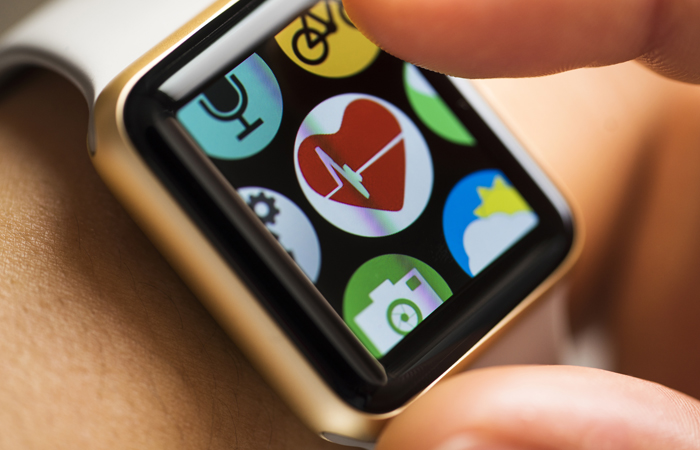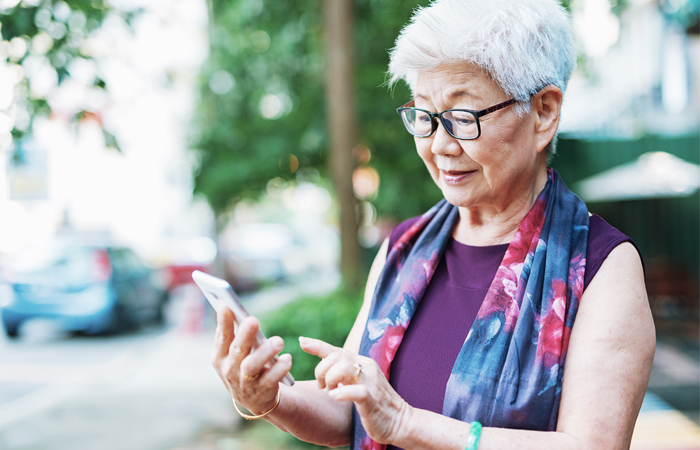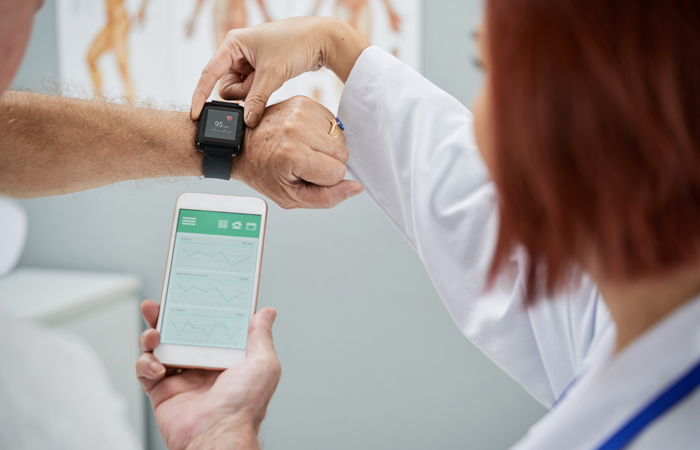Let's get digital, digital
In OTC
Follow this topic
Bookmark
Record learning outcomes
With over half of Brits using health apps and wearables on a daily basis, the PAGB is calling for more digital solutions to be introduced to help people self care and free up GP appointments
Digital technology is playing an increasingly important role in modern life, especially in health and wellbeing. However, a new PAGB report from August 2019 on Self care and technology reveals that more can be done to improve access to technology that helps people identify and manage self-limiting conditions.

The report found that 57 per cent of Brits use at least one type of app or wearable on a daily basis to manage their health. Yet the report also found that only 16 per cent use a device or app to access information about health conditions and symptoms, focusing more on general wellbeing and lifestyle. PAGB is calling for more digital health solutions to be introduced to help people self care and to free up GP appointments, as well as to incorporate the role of community pharmacists into digital technology, especially online triage systems.
“The NHS needs to make it easier for people to access health information, so that they know which health service is right for their needs,” says GP Dr Sarah Jarvis. “I agree with the PAGB recommendation that the NHS website and NHS App should include a section dedicated to self care, with factsheets and easy to understand videos. Similarly, we would like to see online triage systems directing people based on their symptoms and sending them to pharmacy when appropriate for self-treatable conditions, rather than the GP. Giving pharmacists ‘write’ access to people’s health records would help people to see pharmacists as part of the primary care team and help me, as a GP, to provide seamless care, as I will know what advice or treatments the pharmacist has recommended.”
57 per cent of Brits use at least one type of app or wearable on a daily basis to manage their health
NHS digital integration
The NHS Long Term Plan commits to every patient having the right to be offered digital-first primary care by 2023/24. In particular, this would benefit people in remote or deprived areas, people who don’t live near a GP surgery or don’t have enough GPs in their area, and people with long-term health conditions who need regular contact with a GP.
According to NHS England, there has been recent growth in digital GP providers, offering a model that enables patients to register with them directly and contact the practice through an app – they can check their symptoms, message the practice, monitor their health and take part in video consultations. NHS England plans to make it easier for existing GP surgeries to expand and improve their own digital services. However, current contract rules were not designed for digital-first services and cause problems for the existing practices.
The NHS App was launched in January 2019 to make it easier for patients to book GP appointments, order prescriptions and check their medical records on their smartphone. This was followed in February 2019 by the launch of the Government’s NHSX unit to look at ways of making more NHS services available to all patients through digital technology. The NHS App is proving to be popular among patients. However, there are concerns that the increase in technology could create a digital divide. To close the inequality gap, these technologies need to be accessible to all, not just those patients who can afford the latest devices, such as smartphones and tablets.
“Many GP practices already offer patients a range of digital services, such as self-check-in desks and text message reminders for appointments, electronic symptom checkers and email contact with their surgery,” says Professor Helen Stokes-Lampard, chair of the Royal College of GPs. “This app will certainly complement those initiatives, but we need to make sure that patients who do not have access to a smartphone – or are just not as tech-savvy – can continue to make bookings and access healthcare in more traditional ways.”
Alexa, what’s wrong?
In July 2019, the Department of Health and Social Care (DHSC) announced that the public will be able to get NHS-verified health information through Amazon’s voice-activated speaker Alexa following simple voice commands.
It is thought that this new collaboration will be especially helpful to certain patient groups, such as the elderly and the blind, who may not be able to access the internet through traditional means. The DHSC says the technology has the potential to reduce pressure on the NHS and GPs by providing information on common illnesses.
It is estimated that 14 per cent of UK households now have voice-activated speakers and that 50 per cent of searches will be by voice by 2020.
“Nhs.uk is already one of the most reliable online sources for health advice, symptom and treatment information, and many people are familiar with voice-assisted technology and feel comfortable using it,” says Professor Helen Stokes-Lampard, chair of the Royal College of GPs. “Combining the two could be an effective way of accessing information about your health without leaving your home – thereby freeing up more GP appointments for those patients who need them most. However, it is vital that independent research is done to ensure that the advice given is safe, otherwise it could prevent people seeking proper medical help and create even more pressure on our overstretched GP service.”
Health app awareness
The market for digital health is increasing rapidly, especially as the prevalence of chronic health problems, such as diabetes and heart disease, rises. According to the PAGB report, in 2017 there were 325,000 health apps available worldwide, with 78,000 new apps added in 2017 alone. The report predicts that over the next five years artificial intelligence (AI) and remote monitoring will be “the most disruptive forces in health apps and wearables”.
“Wearables are well-established in wellness and fitness tracking and are being used to manage some acute conditions, such as fever in infants,” says Dave Evendon-Challis, VP Innovation at RB. “Trials are also being undertaken to ascertain their value in managing chronic conditions. The NHS has deployed fitness trackers as part of a pilot programme to help manage diabetes. In the trial, targeted at those at risk, devices were used to monitor individuals’ exercise levels and enable them to set and monitor goals. 68 per cent of those referred to the pilot digital scheme engaged in the programme, compared with about half of people only offered face-to-face support, seemingly supporting wearables’ effectiveness.”
Health apps and devices have a wide range of uses, from active monitoring and prevention, such as smoking cessation advice, to self-management and treatment including cognitive behavioural therapy. By 2021, the NHS hopes to integrate data from wearable devices and lifestyle apps into the NHS App and have this data linked to a patient’s health record. However, there are concerns about data privacy, clinical safety and system security. In May 2019, the Social Market Foundation’s report on National Health Servers: delivering digital health for all noted that policymakers also have to be increasingly alert to the risks of over-diagnosis as these technologies roll out.
“People can misinterpret the data they display, leading them to take unnecessary action – or not act at all,” says Dave. “However, if wearables evolve and gain credibility among healthcare practitioners, then this community could play a significant role in advocating and driving their uptake.”

Pharmacy advice
With thousands of health apps available, it can be difficult for patients to know which ones to choose. Two-thirds of health apps and wearables relate to healthy living, including fitness, lifestyle, stress, diet and nutrition. According to the PAGB report, two-thirds of 18- to 35-year-olds trust health and wellbeing digital devices and apps, compared with only a quarter of 46- to 55-year-olds and 19 per cent of 56- to 65-year-olds.
The NHS Apps Library provides information on more than 70 options, with the aim of helping the public find reputable, safe and effective apps and online tools to help them manage their health and wellbeing. The apps listed cover a wide range of topics, from teenage and student health to mental health, first aid advice, help for specific conditions (e.g. diabetes and asthma) and exercise programmes. There are also apps for messaging healthcare professionals, booking GP appointments and managing repeat prescriptions.
Health app evaluation and advisor organisation Orcha helps governments and health and social care organisations choose and deliver health apps that will safely make the biggest impact in terms of improving outcomes. “Consumers find it very hard to spot the apps that work and are secure, which are ineffective and which are dangerous,” says Liz Ashall Payne, CEO at Orcha. “And there’s no correlation between consumer reviews and quality. Because the app stores aren’t regulated, healthcare professionals don’t know which apps to trust and so don’t recommend apps to patients. This concern is understandable as we’ve reviewed almost 6,000 health apps and only 15 per cent meet our minimum quality standards.”
Community pharmacies are well placed to offer advice on digital technology and help customers to interpret data correctly. “They are close to their customers – they know the individual and understand their specific needs,” says Liz. “There are particular groups of people where this is especially so, such as new mothers and those with long-term conditions. The one-to-one relationship will enable a pharmacist, with the right tools, to make customers aware of the right app and could help them to access it. Being a trusted figure, this leads to much higher uptake and usage.”

Digital diabetes support
In August 2019, NHS England announced plans to expand the Diabetes Prevention Programme (DPP) to offer digital support to thousands of people who are considered to be at risk of type 2 diabetes. Up to a fifth of the 40,000 places on the programme per year will now be delivered digitally. The digital programme provides 24/7 access to online tailored, personalised advice. Those taking part will receive wearable tech with apps that monitor levels of exercise and provide access to health coaches and information. They will also have access to online peer support groups with the ability to set and monitor goals electronically.
Trials of the digital programme involving more than 5,000 people found that 68 per cent of those referred to digital schemes took part, compared with around half of those offered face-to-face support. In addition, the average age of digital participants was 58 years compared to the average of 64 years of those using face-to-face interventions.
